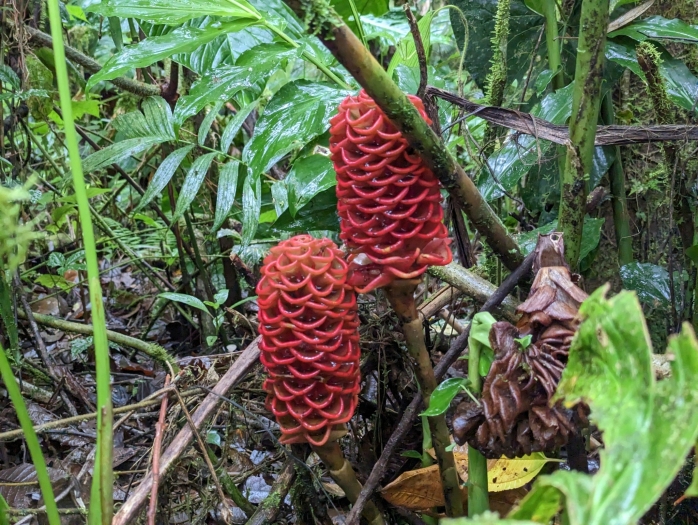Beehive Ginger
(Zingiber spectabile)
Beehive Ginger (Zingiber spectabile)
/
/

Attila Oláh
CC BY 4.0
Image By:
Attila Oláh
Recorded By:
Copyright:
CC BY 4.0
Copyright Notice:
Photo by: Attila Oláh | License Type: CC BY 4.0 | License URL: http://creativecommons.org/licenses/by/4.0/ | Rights Holder: Attila Oláh | Publisher: iNaturalist | Date Created: 2023-05-06T07:59:51-07:00 |
























Estimated Native Range
Summary
Zingiber spectabile, commonly known as Beehive Ginger, is a perennial herb that is native to the understory of tropical rainforests in Maritime Southeast Asia, particularly Malaysia. It typically grows to a height of 4-6 feet (1.2-1.8 meters) with a similar spread. The plant is noted for its unique inflorescences, which resemble beehives and can range in color from yellow to red. These showy bracts appear in the summer and last into the fall, providing a long-lasting display. The true flowers are small and white, emerging from the bracts. Beehive Ginger has broad, lance-shaped leaves that add to its tropical appearance.
Beehive Ginger is valued for its striking inflorescences, which are often used in tropical flower arrangements. It thrives in warm, humid environments and is commonly cultivated in subtropical and tropical gardens as an ornamental plant. In cultivation, it requires consistently moist soil, high humidity, and partial to full shade to mimic its native rainforest habitat. It is not drought-tolerant and can suffer in dry conditions. While it has traditional medicinal uses in Southeast Asia for treating inflammation and burns, and its antimicrobial properties and potential in cancer treatment have been studied, it is primarily grown in the West for its ornamental appeal. Beehive Ginger can be susceptible to root rot if overwatered or if the soil does not drain well.CC BY-SA 4.0
Beehive Ginger is valued for its striking inflorescences, which are often used in tropical flower arrangements. It thrives in warm, humid environments and is commonly cultivated in subtropical and tropical gardens as an ornamental plant. In cultivation, it requires consistently moist soil, high humidity, and partial to full shade to mimic its native rainforest habitat. It is not drought-tolerant and can suffer in dry conditions. While it has traditional medicinal uses in Southeast Asia for treating inflammation and burns, and its antimicrobial properties and potential in cancer treatment have been studied, it is primarily grown in the West for its ornamental appeal. Beehive Ginger can be susceptible to root rot if overwatered or if the soil does not drain well.CC BY-SA 4.0
Plant Description
- Plant Type: Herb
- Height: 6-8 feet
- Width: 3-4 feet
- Growth Rate: Moderate
- Flower Color: Yellow, Green
- Flowering Season: Summer, Fall
- Leaf Retention: Deciduous
Growth Requirements
- Sun: Part Shade
- Water: High
- Drainage: Medium
Common Uses
Border Plant, Potted Plant
Natural Habitat
native to the understory of tropical rainforests in Maritime Southeast Asia, particularly Malaysia
Other Names
Common Names: Malaysian Ginger, Golden Cone Ginger
Scientific Names: , Zingiber spectabile,
GBIF Accepted Name: